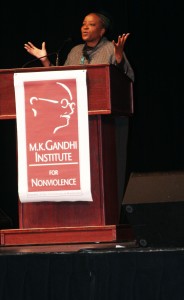
Naomi Tutu, daughter of Desmond Tutu, spoke at UR on Sunday, April 3, to discuss a shared humanity between friends and enemies. Courtesy of Drue Sokol, Photo Editor
Peace, healing, unity and a little humor were all manifested at the podium of Strong Auditorium last Sunday, as the Season for Nonviolence culminated with a speech by Naomi Tutu, the daughter of world renowned South African activist Desmond Tutu. President Joel Seligman introduced Tutu to a mixed crowd of Rochester residents, students, staff and faculty, including University Vice President Paul Burgett and Rochester Center for Community Leadership Director Glenn Cerosaletti.
Tutu charged the audience to recognize a shared humanity amongst their friends and enemies alike. Tutu repeatedly stressed that, for the cases in which individuals fail to respect another’s humanity, both parties are dehumanized. She even went as far as to say that she partially dehumanized herself in her early hatred for the South African government and their imposition of apartheid. But Tutu stood by her principle, saying that oppression does not warrant dehumanization.
“There can be no war to oppress others without being dehumanized yourself,” she said.
Tutu also compared the principle to some of the trademark frustration that the media has projected on Tea Party supporters. She argued that the staunchest voices of the movement are simply seeking respect in a system that they perceive to be fundamentally and necessarily divisive.
“These people respect me, and for some reason, they think that I am important,” she said, in references to the epithets that Tea Party leaders may feel. “Can you recognize that? I can understand that. [But] you can be respected in a community that doesn’t try to divide.”
Tutu’s deliveries also drew on examples from her own life. In one instance, she drove home her point about an African proverb for unity when she spoke about some of the feuds that she and her siblings had when they were younger. She said that sometimes they would argue with her, even though they weren’t as smart as her. But she began to understand her parents when they told her that when she belittled her siblings, she was also dehumanizing herself.
Tutu finished her address with a closing principle for attendees to carry home with them.
“The Season of Nonviolence is about going out and saying ‘peace, peace, peace,’” Tutu said. “It’s about going out and saying ‘I see you, a person of infinite worth. I see your humanity, and I recognize that your humanity and mine are one.’”
When a student asked Tutu about different ways that students can practice that principle, she advised for everyone to make an effort to have lunch and conversation with someone who has fundamentally different views than their own, whether religious, political or cultural.
The Season for Nonviolence, first launched by the United Nations in 1998 as a time to seek peace, reflection and social welfare, is celebrated in 400 communities across the globe from Jan. 30 to April 4 — the dates of Mahatma Gandhi and Dr. Martin Luther King, Jr.’s deaths, respectively. The Gandhi Institute for Nonviolence celebrates the Season with more than 12 articles, interviews, news video clips and even public service announcements on WDKX from City Councilwoman Elaine Spaull and Police Chief James Sheppard.
The Season, which was sponsored by 22 groups, including community organizations, University departments and student groups, involved a myriad of programs in addition to the major events directly organized by the Institute. From a daily musical celebration of nonviolence at the Liberty Pole to a screening of “A Force More Powerful” by the Rochester Friends, the Season had several organizations involved from all segments of the community.
Students for Interfaith Action (SIA) were one of the more active Students’ Association clubs during the Season. Last week, SIA orchestrated “Peace and Diversity Week,” which consisted of three unique events. Senior and SIA President Naomi Ahsan said that the Religious Persecution Awareness Dinner had the strongest turnout because the stories and reflections were relevant to some of the students in attendance. One of the students, freshman Mohammed Ahmed, shared his story as a youth growing up in war torn Sudan and the religious underpinning beneath the violence.
Now that SIA week, as well as the Season, is over, Ahsan is hopeful that those who participated will be reinvigorated and unified.
“[I hope that this will bring] a greater sense of University community and kinship,” Ahsan said. “Each of us is interdependent with one another based on the classes we take together or teach each other, where we eat, where we work, where we live. I really hope that SIA’s events have helped to make us more sensitive, understanding and kind to one another — that is already part of what it means to be from UR, and I am grateful for the chance to contribute anything to that.”
As the Season concludes, Miller and the Institute will continue their Restorative Rochester campaign and prepare for their transition to their new location on South Plymouth this fall. In the meantime, Miller suspects the Season’s participants to carry on the spirit of nonviolence all year round.
“We can’t become nonviolent without training and commitment — the differences between Egypt’s democracy movement, where student groups had been trained in nonviolence tactics similar to the civil rights workers, versus how it has gone in countries like Tunisia and Libya, bears testimony to that,” she said.
The Institute will wrap up this semester with their final “Being the Change” event on Friday, April 15 and an Earth Day keynote address from systems thinker and permaculture designer Dave Jacke, which is co-sponsored by Grassroots.
Nathaniel is a member of
the class of 2011.



